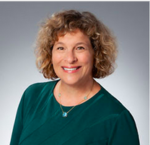By Heidi Gantwerk

SAN DIEGO — When my kids were very young, we had a Thanksgiving tradition (no doubt like so many other American families) of going around the table and saying what we were thankful for. The answers ranged from the sublime to the ridiculous, depending on the age and mood of the three boys. There were eye rolls, groans, occasional middle-school snark, and, more often than not, deeply touching and personal moments where we expressed gratitude for what mattered most. If ever we forgot to ask, inevitably someone at the table would shout, “We never said what we were thankful for!” And one by one, we would share.
Eventually, this practice extended to Friday nights. Each week, we asked, “What was one good thing that happened in your life this week?” The answers were always a highlight and always lightened our spirits and carried us into Shabbat.
This year, our Thanksgiving table was smaller. Two of my three children now live on other continents. Yet, we all still gave thanks – we have so much to be grateful for. And I couldn’t help but reflect on how healing it feels to name the good in our lives, especially when the world seems increasingly complicated and dangerous. Many people feel anxious and afraid, and it’s all too easy to focus on what we don’t like or what we want to change – about ourselves, our loved ones, our community, or the world.
Actively practicing gratitude is core to Jewish practice and expression. The Jewish value of hakarat hatov – recognizing the good – emphasizes the importance of recognizing the many blessings in our lives. For a people who (according to comedians, movies, and TV) supposedly do a lot of complaining, our sacred texts and liturgy certainly spend a lot of time on gratitude. We have lessons woven throughout numerous Jewish texts about the importance of recognizing the good, and the price we pay for failing to do so.
But embracing hakarat hatov does not mean ignoring the world’s problems or personal challenges. We are still commanded to address what is broken and strive to fix it. Our task is to strike a balance: to realistically acknowledge the bad, the broken, the curses, while appreciating the light, the good, and the blessings.
Numerous studies suggest that practicing gratitude leads to greater emotional and social well-being, better sleep, improved health, increased resilience, enhanced empathy, and reduced aggression.
So, this Thanksgiving weekend, in keeping with Jewish values and practice, I am making a point to do my best to recognize the good. A recent Harvard Medical School Journal article suggested asking ourselves these six questions to evoke gratitude:
–What happened today that was good?
–What am I taking for granted that I can be thankful for?
–Which people in my life am I grateful for?
–What is the last book I read or movie, show, or social media clip I saw that I really appreciated, and why?
–What am I most looking forward to this week, month, and year, and why?
–What is the kindest thing someone has said or done lately?
I have many answers to these questions. Today, I am grateful for the ceasefire on Israel’s Northern border, which I hope will be the first step toward lasting peace for the region. On a personal level, I am grateful for my family: my three wonderful sons and my husband, to whom I’ve been happily married for 32 years as of yesterday.
I am grateful for our tireless Federation staff, who are just as passionate about our mission as I am. For our outstanding and devoted lay leaders, who invest so much time and love in our Jewish community. For our generous donors, who make all our work possible. For the multitude of gifts that Judaism and being part of the Jewish people have given me.
Even in this most difficult year – in fact, especially in this most difficult year – I am grateful to wake up every day and do work that truly makes a difference, alongside people who care deeply. A life rich in blessings indeed.
Wishing you all a restful weekend, filled with love, peace, and gratitude.
*
Heidi Gantwerk is the President and CEO of the Jewish Federation of San Diego.